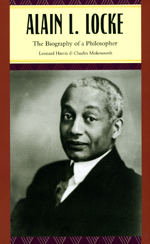The untold story of an influential African American intellectual

Black History Month offers an occasion to highlight some the nation’s most influential African-American scholars, activists, and leaders. Mostly, the focus is on the usual list of iconic figures—Martin Luther King, Rosa Parks, and now, Barack Obama. But this year authors Leonard Harris and Charles Molesworth offer a timely tribute to one of the lesser known, yet most influential African American intellectuals of the twentieth century with their new book, Alain L. Locke: The Biography of a Philosopher. A fascinating look at the life of a man often called the “father of the Harlem Renaissance” and whom the authors dub “the most influential African American intellectual born between W.E.B. Du Bois and Martin Luther King, Jr.,” as book critic Carlin Romano writes in his review for the Philadelphia Inquirer, the untold story of Locke’s profound impact on twentieth-century American culture and thought has been long overdue. From the review:
This long-overdue book—astoundingly, the first full biography ever of a thinker for whom schools, prizes and societies across America are named—closes a project [Harris and Molesworth] decided to do together after originally embarking on separate lives of their subject.
Why has it taken so long for a definitive biography of Locke to appear, when works on comparable black intellectuals abound?…
Locke scholar Russell J. Linnemann once offered a celebratory explanation. Noting Locke’s extraordinary interests in “anthropology, art, music, literature, education, political theory, sociology and African studies,” Linnemann speculated that few “potential biographers” possessed the “intellectual breadth” to “fulfill the task properly.”
Yet Harris and Molesworth also draw back the curtain on other factors. Perhaps the largest is that Locke was gay and closeted, though people of any acuity understood his sexuality.…
Harris and Molesworth close that gap, not going into Locke’s intimacies with the detail of Harris’ essay, but explaining how they shaped the philosopher’s prodigious aesthetic sensibilities.
The third important obstacle to a Locke biography was its subject’s personality. Harris and Molesworth’s adjectives for their subject, such as “aloof” and “elitist,” confirm that Locke, as they report, “did not suffer fools gladly,” and was always more respected than loved.
Harris and Molesworth’s book thus unfolds as no hagiography, but a critical, contextualized understanding of a singular thinker who did not fit the stereotype of many black intellectuals.…
A memo, then, to students, teachers and staff at Philadelphia’s Alain Locke Elementary School, their colleagues at all Locke schools elsewhere, and to winners of the Alain Locke Prize at Harvard, given to the student with the highest GPA in African American studies:
That “Alain Locke” with his name on the wall was also a living, breathing, peculiar character at the very top of his talented tenth. This, finally, is his story.
Read the rest of Romano’s article on the Philly.com website.